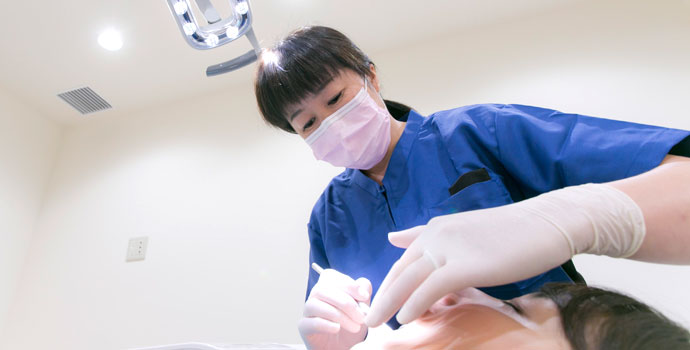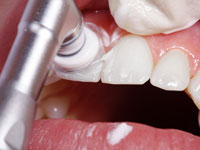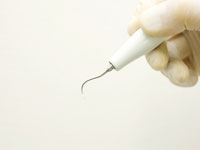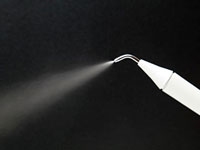About Preventive Dentistry
Our Philosophy
From “going to the dentist when it hurts” to “going to the dentist to prevent it from hurting

Traditionally, a dentist’s office was a place where you went when you felt pain. And, it was a place where you did not go until it hurt again. However, the effectiveness of preventive dentistry has become clear, and the idea that care and maintenance are important to maintain healthy teeth is spreading, and the dentist’s office is changing into a place where people go to prevent their teeth from becoming painful.
Preventive dentistry is a very smart way to go in the long run.
For example, a cavity covering or filling has a life span and is usually replaced in 5 to 10 years, depending on the quality of the material. Since the replacement requires grinding down the original tooth, the strength of the tooth is gradually weakened, and it is not uncommon for the tooth to eventually be lost and require expensive treatment such as implants or dentures.
On the other hand, regular preventive dental visits, checkups, and maintenance will keep your teeth and mouth clean, and if you do develop tooth decay or gum disease, it can be cured with simple treatment in the early stages. You will not have to spend a lot of time visiting the dentist for treatment, suffer the pain and anxiety of treatment, or spend a lot of money on expensive treatments.
Preventive dentistry may seem time-consuming and expensive when considered in terms of months or years, but when considered over the course of a lifetime, it is a very smart and effective way to spend your time and healthcare dollars.
Good oral health can also protect your overall health!

It goes without saying that chewing and eating well is the source of good health. On the other hand, many bacteria and viruses enter the body through the mouth. In recent years, we have also learned that bad bacteria in the mouth have been linked to diabetes and pneumonia. Keeping your teeth and mouth clean through preventive dentistry is also linked to your overall health.
Oral cleanliness is especially important for the elderly.
Oral care is even more important for the elderly. Their immune systems are weakened, making them more susceptible to colds and flu, while physical problems, such as difficulty with wrist strength, make it harder to brush and clean their teeth. Furthermore, chewing your food well has been reported to help prevent dementia. It is therefore necessary for the elderly to undergo regular checkups and maintenance.
Features of our clinic
We work together with our patients for prevention.

We believe that preventive dentistry is the basis of all treatments to prevent dental diseases and problems such as tooth decay and periodontal disease, and to ensure healthy teeth and mouths in the future.
In preventive dentistry, we first check for any problems in the mouth, and perform examinations and maintenances according to a preventive program tailored to each individual patient.
We also provide TBI (Tooth Brushing Instruction) to help patients learn how to brush properly with a clean toothbrush so that they can prevent dental problems. We want to help you keep your teeth healthy and beautiful by preventing tooth decay and gum disease and by continuing to take simple daily care of your teeth.
We also offer programs for those who prefer a more thorough examination.
We offer a comprehensive thorough examination program that is similar to a dental physical exam. Please contact us to discuss your needs.
Contents of our comprehensive thorough examination
- Intraoral standard photographs
- Facial photographs
- Various radiographs
(Panoramic radiographs, dental radiographs, head radiographs *as needed for orthodontic analysis) - Analysis of the model on the articulator after taking upper and lower impressions (mold)
- Jaw function test (check of jaw joints and surrounding muscles)
- Saliva test
Our Preventive Dentistry Menu
Mouth cleaning by dental professionals [PMTC].

PMTC (Professional Mechanical Tooth Cleaning) is an oral cleaning performed by a dentist, dental hygienist, or other professional using specialized equipment. PMTC removes plaque and tartar, which grow into a biofilm, a stain that cannot be removed by brushing, and restores the whiteness of teeth and healthy gums. It is effective not only in preventing cavities and gum disease, but also in improving bad breath. After cleaning, the teeth are coated with a fluoride gel to strengthen them. Your tongue will feel smooth and your mouth will be refreshed.
Clean your mouth [plaque and tartar removal].

Plaque and tartar, which are direct causes of tooth decay and gum disease, are removed. Hardened tartar is removed with a special ultrasonic scaler, which allows for painless and precise removal. In addition, we will teach you how to brush your teeth until brushing becomes a habit.
Airflow” to remove stains

Airflow removes stains caused by tea and coffee, which are difficult to remove with daily brushing, as well as stains on the tooth surface caused by tobacco and other substances. By injecting ultra-fine powder onto the teeth with a water spray, stains are removed in a short time without damaging the tooth surfaces. When Airflow is combined with PMTC, it also has the effect of making plaque and stains less likely to stick.
Effective in preventing tooth decay [Fluoride application].
This is the most effective way to prevent tooth decay, coating the tooth surface with fluoride. Fluoride has the effect of making the tooth surface less likely to dissolve, suppressing the ability of bacteria to produce acid, and aiding remineralization, so very early cavities can be restored. It is most effective when administered to cavity-free teeth immediately after eruption, but continued application will increase the amount of fluoride in the enamel surface layer and strengthen the tooth structure. Fluoride application is recommended once every 3-4 months to prevent tooth decay.
<歯の健康セルフチェック> こんな不安があったら歯科へ!
- 最近、舌や歯肉などに変わったことはありませんか?
- 口腔のがん検診を受けていますか?
- あごに不具合はありませんか。しっかり噛めますか?
- 食事中にあごに音や痛みはありませんか?
- 歯がしみたり、痛んだりしませんか?歯に穴があいていませんか?
- 歯ぐきが腫れたり、膿がでたり、歯がぐらぐらしませんか?
- お口の臭いが気になりませんか?
- 口の中が乾いたり、食べ物の味が変わったりしていませんか?
- 歯や歯ぐきの形や色が気になりませんか?
- その他、お口の中で気になっていることはありませんか?
